|
|
||||
|
by Misha Zubarev  Brunch time, and blazing heat coupled with dry humidity of the dense polluted air defined another noisy and busy Monday morning in the city of Like many Having arrived fifteen minutes early, I had the pleasure of speaking with Akin’s publicist during my wait, which wasn’t long, and before I knew it I was shaking hands and making small talk with the filmmaker himself. Happily, Akin seemed as excited to be there as I was, and it wasn’t long before we grew accustomed to one another and started the interview. To see Bruce Lee as a 5-year-old is like taking speed. I began casually by asking Akin about his first memorable interest in film. To my surprise, he told me it was Bruce Lee’s Fist of Fury. When he was about five years old, his cousin had obtained the first reel of the film (back then the reels were very expensive and each one was only a portion of the film), which featured a long sequence of Bruce Lee fighting thirty Japanese men. That amazing fighting sequence stood out in his mind as he watched it over and over “at least a hundred times.” After over thirty years, Akin has developed his filmmaking skills and achieved an acclaimed body of work. But even now, as he reflects back on that day, he says “to see Bruce Lee at the age of five is like taking speed.” It’s all about struggling. It is never easy for an outsider to fit in. As an immigrant myself, I know that to be the case. Likewise, the same applies for those of Turkish descent who reside in Living in I write to music. Part of Akin’s personal excitement about being in the Big Apple comes from being a collector of Vinyl Records, jazz in particular, and what better place to further such a collection than in New York. Why Jazz? Akin explained that as he writes his screenplays he always listens to jazz music. He finds it unobtrusive – in fact, quite the opposite. In many cases he has even used a soundtrack he had listened to while he was writing a specific sequence. For example, while he was writing the When Akin finishes the first draft of a script, he goes back through his soundtrack list, puts each song in chronological order, burns them to a CD and listens to them while reading the script. He refers to this process as a “musically emotional map of the film.” This process only applies to pre-existing soundtracks, but working with composers is a much grander experience, and Akin wants to do more of that in his future films. I adore things that I cannot do. While many recognize Fatih Akin as an award-winning filmmaker, few know of his other accomplishments. For instance, he is a nightclub DJ, appearing under the pseudonym “DJ Superdjango”. Not wholly retired from the trade, he still makes some local appearances in What Akin cannot do in real life, his characters make up for on screen. Almost every one of his films features a character involved in painting. When asking Fatih why, he simply says, “I adore things that I cannot do” -- so he lets his characters fill in the gap. I’m not the filmmaker I would like to be… Observing his films from a meta-level, I believe Akin’s body of work transcends itself from illustrating traits of a broken home to recipes for an unbreakable one. While Head-On (2004) deals with two different and incompatible cultures trying to blend in, as illustrated through the music motifs of German punk rock attempting to merge itself with the antithesis of traditional Turkish music, Soul Kitchen flips the purpose of the soundtracks and gourmet motifs, using them to bring together a multitude of different cultures and backgrounds under one roof of Zinos’ restaurant, “like a place [they] can call home”. Akin’s Soul Kitchen is nothing like his last two films, Head-On and Edge of Heaven, and, after asking about how he perceives himself as a filmmaker and storyteller, I found his response quite interesting. Contrary to what I expected, Akin never wants to adhere to any specific style. Always looking for an element of surprise in his storytelling, he wants his viewers and critics to have a sense of freshness about his works. “I’m not the filmmaker I would like to be,” Akin confessed. When creating a story, he intuitively puts characters above plot, but at the same time he expresses a desire to be more “disciplined” and to write plot-oriented films. He admires filmmakers who can “paint” a story with the lens of their camera. Even more so, he admires those who can merge their ability to paint a story that is both a plot and a character-driven one, mentioning Martin Scorsese in this regard. He doesn’t think that’s something he can do. Fortunately, his fans and critics have faith in what he has accomplished thus far. We enjoy watching his works for their constant freshness and originality, and what makes each new one interesting is the unpredictability of the process. Because of his ever-changing storytelling that defines the environment of his characters and his sheer honesty in portraying them, Fatih Akin has emerged as a filmmaker with a vision and a point of view. |
||
|
© 2025 - ReelTalk Movie Reviews Website designed by Dot Pitch Studios, LLC |



